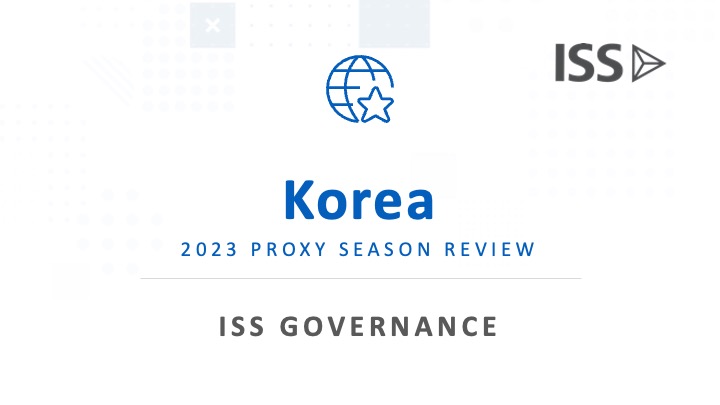Below are key takeaways from ISS’ recently released 2023 Proxy Season Review – South Korea. The full report is available to institutional subscribers by logging into ProxyExchange then selecting the Governance Exchange and its Report Center tab and to corporate subscribers by logging into Governance Analytics then selecting the Governance Exchange and the Report Center tab.
- Despite continued regulatory efforts to reduce meeting concentration, the concentration remained extremely skewed to the last week of March. This even increased this year, with 73 percent of companies holding their meetings in the last week of March, up from 63 percent in 2022 . In the past three years, regulators have encouraged companies to change their record dates and subsequent general shareholders’ meeting dates. However, most companies kept their record dates unchanged, and thereby continued to grapple with obtaining audited opinions sufficiently ahead of the meetings.
- Shareholder activism increased to an unprecedented level this season, as actions towards governance reform accelerated. The number of shareholder proposals reached a record high level this year; a total of 175 shareholder proposals were submitted to 47 companies.
- Shareholder activists target the entrenchment of controlling stakeholders. Notably, domestic activist investorsincreasingly demanded capital return in the form of dividends and/or share buybacks in this season, citing the board’s cash-hoarding malpractice to serve the interests of de-facto controlling stakeholders. Many shareholder campaigns succeeded in raising awareness but came short of offering resolutions.
- Since the new administration was inaugurated in May 2022, several significant regulatory changes have been announced to enhance minority shareholders’ rights. Coupled with the regulatory shift, the domestic investor community increasingly called for actions to diminish Korea-specific governance valuation discounts.
- Meanwhile, the financial authorities announced intent for corporate governance reform targeting financial companies and government-owned companies. Based on the new leadership’s commitment to governance reform and the escalated interests in minority shareholders’ rights,dynamic changes are expected in the near future. Coupled with the regulatory governance reform, the changes in corporate governance are expected to be significant and shareholder activism is also expected to continue to increase in Korea.
If you are not a subscriber, please contact sales@issgovernance.com (for institutional investors) or contactus@isscorporatesolutions.com (for corporations) to learn more about accessing bespoke governance research.
By: Candice Kim, Jieun Chang, Jaesung Lee




